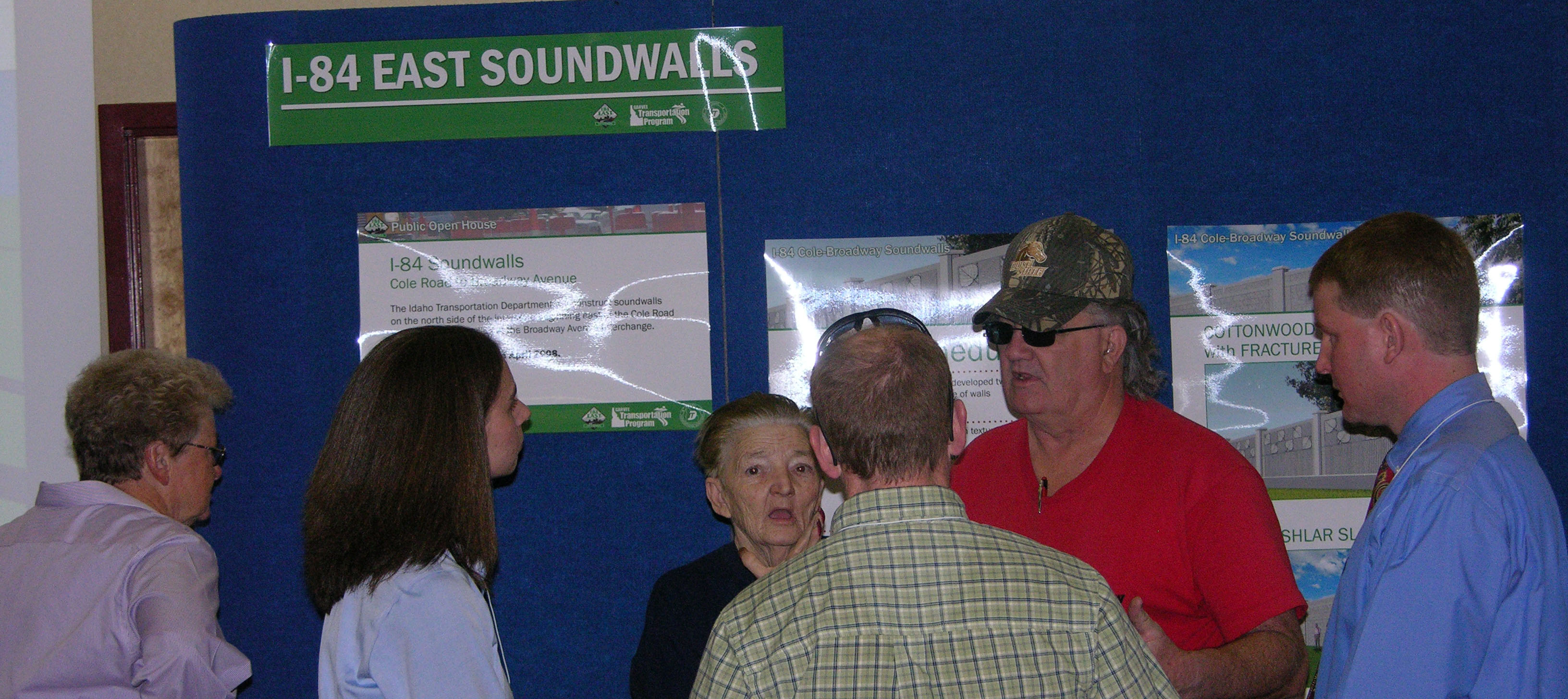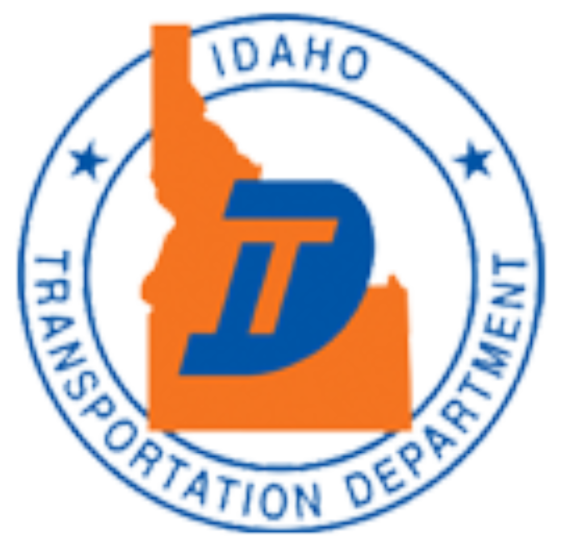Public Comments & the Decision-Making Process
Whether it is formal or informal – all comments are important to ITD. The Office of Communication along with the entire department must work cooperatively to carefully process comments to be used in a variety of plans, projects, processes, etc. Comments are collected throughout the year with special emphasis being placed during open public comment periods. The consideration process is outlined in the following pages.

Quick Links
Click the links below to navigate to the
main topics of this chapter.
STEP 1: SOLICITATION
The first step to getting comments from the public is to ask. This requires two-way communication where we have to listen more than we speak. ITD is always looking to its stakeholders for guidance and feedback. Comments may be solicited informally and/or formally.
Informal Comments are often received during one-to-one discussions, multi-jurisdictional group meetings, telephone calls, emails, social media, transportation fairs, or in conversation with ITD staff. Although comments are not formally requested, this is a very important part of project and plan development because discussions are had where staff and stakeholders can discuss issues and staff can ask questions to better understand the needs and wants of the community.
Formal Comments are solicited during official comment periods to offer an opportunity for the widest array of interested parties to provide input on documents, plans, and processes. These comment periods and their timeframes are highly advertised to enable that everyone in the state is aware that comments are being accepted. Formal comment periods are used for public involvement consultation plans; long-range and corridor planning; air quality conformity determinations; and the update of Idaho’s Transportation Investment Program (ITIP). Below outlines some of the minimum timeframes used for accepting comments. Each of these will be discussed in depth throughout the document.
- 60-days for non-metropolitan consultation processes
- 45-days for long-range transportation plans
- 30-days for district corridor plans or district plans
- 30-days for the annual update of the ITIP
- 30-days for 129,000 Pound Truck Route Modifications
- 30-days for Public Hearings
- 30 days in advance of Interagency Consulting Committee meeting for technical air quality conformity determinations
- 14 days in advance of Interagency Consulting Committee meeting for non-technical air quality conformity determinations
- 7-days for ITIP Amendments
STEP 2: DOCUMENTATION
Once a comment has been made, staff is advised to record every public comment that is collected in ITD’s Public Comment database. Whenever possible, staff should keep information on each comment such as the date; commenter information (if submitted); the substance of the comment; referenced project key number or name; responses, etc.
Informal Comments are usually made in a casual setting or during meetings. These types of comments can be difficult to track; however, ITD staff will attempt to capture general comments either in their notes or by using meeting minutes. It is highly recommended that if the issue is of great importance or if a response is desired (required for significant air quality comments); to put comments in writing and submit via ITD’s comment portal for consideration.
Formal Comments that are made in writing, on official comment forms, submitted via email, and other forms of written communication are always tracked. Comments are collected and considered especially during official comment periods where stakeholders are asked to comment on the ITIP or Amendments to the ITIP or during project and plan development.
STEP 3: ANALYSIS
All comments should be analyzed to determine the appropriate staff response which can range from a verbal answer during a meeting, a written letter or email reply, or a telephone call. There are four types of comments: informal, procedural, substantial and public records requests.
Informal Comments are general in nature and may not directly relate to a project or plan usually does not require a detailed response. For example, general comments could be: “The Project Team is doing a great job!” or “I am opposed to the project.” All comments will be tracked, however, unless requested by the commenter, ITD does not always respond to these comments but can by email or letter acknowledging their comment.
Sometimes comments are beyond the scope of the subject project or they may be completely outside the sphere of ITD’s influence. For example, “Main Street needs better signal timing.” In these cases, ITD will forward the comment to LHTAC or the appropriate Highway District for consideration.
Other times, the general comment may reveal issues which need to be addressed during future project development. For example, “There are a lot of accidents that occur at this intersection.” ITD will store the comments and consider it in the future.
Procedural Comments usually relate to the public involvement process. For example, “I’ve moved. My new address is ____.” “I would like to get a copy of XYZ map.” or “It was difficult to find the meeting room.”
ITD will make every effort to respond with a letter acknowledging their interest in the project, along with information regarding what action has been or will be taken. For example, “Thank you for contacting ITD, we have updated our mailing list” or “A copy of the map is enclosed” or “ITD plans to provide better signs for our next meeting.”
For general information requests (for matters such as information pertaining to how ITD operates and requests for copies of agency policies, forms, procedures, pamphlets, booklets, and other printed information designed for distribution), staff is encouraged to lead stakeholders to visit the ITD webpage or use the General Information Request form at: https://apps.itd.idaho.gov/apps/WebCommentsV2.
Substantial Comments are often categorized by project phase (i.e., previous, current or future). For example, “I think XYZ should be the ITD’s highest priority.” “I like typical section XYZ.” “Are you going to close my driveway?” “How much of my property will be needed for the project?” or “How long will the road be closed during construction?”
Much of the time, substantive comments require further analysis and it may take a bit longer for staff to respond. However, ITD will make every effort to respond in a timely manner with the information.
Public Records Requests are very important and Idaho Code 74-130(1) requires that staff must respond to the public records request within three working days from the date of receipt of the request. If it is determined that a longer period of time is needed to locate or retrieve information, staff must notify the individual in writing that more time is needed, and then grant or deny the request in whole or in part within ten working days. If there is no response on behalf of ITD within the ten working days, the request is deemed to be denied and the applicant can begin seeking relief through the courts. When a public record request has been made, staff should always let their manager know so that they can contact the Legal Section.
Although letters may be sent by citizens for public records, ITD does have a public records request webpage (for items such as written documents and electronic files containing information relating to the conduct or administration of the public's business prepared, owned, used or retained by ITD) and staff is encouraged to lead stakeholders to visit: https://apps.itd.idaho.gov/Apps/WebCommentsV2/PublicRecord.
STEP 4: ACKNOWLEDGEMENT
If there is not a public records request, ITD staff is encourage to always acknowledge public comments as soon as possible - a reasonable goal is within three to five working days of receipt.
If comments require more detailed information or feedback it may take some time to analyze and research. If staff needs more than ten days to respond, ITD should send a letter or email stating so and the approximate amount of time needed to gather the information and when a response could be anticipated.
Informal Comments may not get a response from ITD. However, this does not mean they are not important or considered. If you want a response to your comment, please let staff know or make it a formal comment. If the comment is via email, it is common courtesy to simply respond with a “Thank you for contacting the Idaho Transportation Department. Your comments are important to us.”
Formal Comments will always be responded to depending upon the parameter of the comment period or situation being considered. Formal comments are those submitted in writing to ITD and have a request for a response. If the comment is via email, it is common courtesy to simply respond with a “Thank you for contacting the Idaho Transportation Department. Your comments are important to us. We will respond to you as soon as possible.”
STEP 5: DISTRIBUTION & TRACKING
ITD gets several comments daily throughout the agency and we want to make sure that all comments are distributed to the appropriate area. ITD’s Office of Communication and/or the Districts’ Public Information Specialist will track the comment from the time of receipt through resolution, ensuring that an adequate response is provided to the public. It is important to note that some comments may require distribution to multiple ITD sections to ensure a complete answer to all issues.
All comments that require detailed information or feedback will be answered as soon as possible (but hopefully within ten days of receipt if possible). Be sure to provide your contact information so the appropriate ITD staff member can call to clarify your question or to send a written response. Do not forget that sometimes responses might be distributed to other sections for resolution and the other section may choose to respond to the comment directly.
STEP 6: INCORPORATION
All comments which are directly relevant to the current project phase should be considered for incorporation into the overall project decision-making process or during the planning development. Cross functional communication between ITD sections may be necessary to resolve key issues. For design details that do not affect the function and/or safety of a project, the community’s preferences should be incorporated into the project, when cost effective and feasible. Careful analysis of public ideas may lead to innovative solutions that address the community’s needs without compromising ITD’s goals.
Informal Comments that are relevant to the development of a project or plan are used in considering alternatives, improvements, or setting policies and direction. For example, throughout the year, Districts are meeting with their respective multi-jurisdictional groups. Often times discussion themes become evident (i.e. collision incidents at a specific location, increased traffic delays, community development impacts on the highway system, etc.) and when staff begins the ITIP update cycle, these themes will be discussed. This is why one-to-one discussions and meeting conversations are so important throughout the year.
Formal Comments are officially considered before a plan or project is developed or adopted. For example, comments made during the ITIP Public Comment Period are collected, addressed, analyzed and provided to the Idaho Transportation Board for its consideration. The Board and staff can make changes to projects and plans based off of stakeholder statements.
STEP 7: SHARING
Through the Communication Portal, ITD staff should compile a synopsis of comments received on various projects and their resolution; an outline of the major comment-generating events (e.g., a survey or public meeting); and all of the outreach meetings conducted by each District/Section. This compilation of comments and responses ultimately serves as an excellent communications record as well as provides ITD with additional consideration on various future plans and projects.
The Office of Communication reports annually on ITD’s outreach activities and the comments received by the ITD Board – usually in September or October. Within respect to the official comments that were received during the ITIP Public Comment Period (which is usually conducted in July), the ITD Board will consider these comments and review how ITD may have modified its plans or projects based on the comments.

